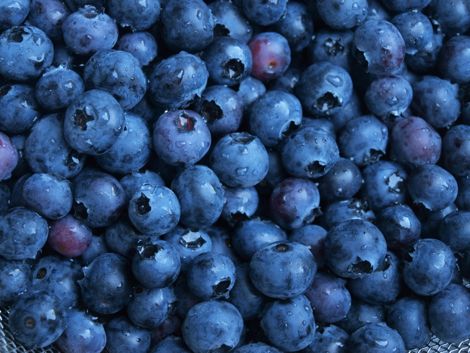Introduction:
Blueberries are among the most important foods for good health. The diverse and wondrous health benefits of blueberries are primarily due to their high content of specialized pigments known as anthocyanins. These special flavonoids are responsible for the deep blue or purple color of blueberries.
Besides lending color to fruits and flowers, flavonoids are responsible for many of the health benefits of foods, juices, and herbs. More than 8,000 flavonoid compounds have been characterized and classified according to their chemical structure. Flavonoids are sometimes called “nature’s biological response modifiers” because of their anti-inflammatory, antiallergic, antiviral, and anticancer properties.
It is a well-established fact that a higher intake of flavonoids offers significant health benefits. Now, a new study has shown that regular blueberry consumption can produce clinical effects in improving the most common form of arthritis.
Background Data:
Most of the research focus on blueberries have been on their effects on cardiovascular, eye, and brain health. For example, it is now well-established that the consumption of flavonoid-rich sources such as berries, apples, green tea, dark chocolate, and red wine have all been shown in population studies to be associated with a significantly reduced risk for heart attacks and strokes. And, in the case of blueberries, actually lower blood pressure as well.
The major benefits of blueberry consumption in protecting against cardiovascular disease (CVD) is largely due to the effects of their flavonoids on improving the function of the cells that line the blood vessels (endothelial cells). The endothelial cells play a pivotal role in the regulation of vascular tone and structure, as well as vascular inflammation and clot formation. The lesions of atherosclerosis (hardening of the arteries) first begin to develop with damage to endothelial cells. Flavonoids, particularly the types found in blueberries, have been shown to protect and improve endothelial cell function. This leads to an increase in the production of nitric oxide by these cells. Nitric oxide plays a central role in determining the tone of blood vessels. Specifically, it exerts a relaxing effect on blood vessels thereby improving blood flow. It also improves blood fluidity and reduces blood clot formation.
The effects of blueberry consumption on nitric oxide is thought to be responsible for its blood pressure lowering effect. In a study conducted at Florida State University, 48 postmenopausal women with mild hypertension were enrolled to evaluate the effects of daily blueberry consumption for 8 weeks. The women were randomly assigned to receive either 22 g freeze-dried blueberry powder or 22 g control powder daily. Approximately 22 g freeze-dried blueberry powder is equal to 1 cup fresh blueberries, an attainable dosage for people to consume on a daily basis.
After 8 weeks, systolic blood pressure and diastolic blood pressure (131 mm Hg and 75 mm Hg, respectively) were significantly lower than baseline levels (138 mm Hg, 80 mm Hg), whereas there were no changes in the group receiving the control powder. Blueberry consumption was also associated with improved arterial stiffness. The biggest change, however, was in nitric oxide levels. Results showed that the nitric oxide level was greater (15.35μmol/L) in the blueberry powder group at 8 weeks compared with baseline values (9.11μmol/L), whereas there were no changes in the control group.
These results show quite clearly that daily blueberry consumption may reduce blood pressure and arterial stiffness, which may be due, in part, to increased nitric oxide production.
New Data:
As blueberry flavonoids exert a multitude of anti-inflammatory effects, researchers sought to determine the effect of blueberry consumption on symptoms of osteoarthritis of the knee in 63 men and women, 45-79 years of age. The treatment group received 40 g of freeze-dried whole blueberry powder that was reconstituted by adding it to 10-12 ounces of water. Each packet was 20 g; they were asked to consume 2 packets per day. Placebo powder was also in 20 g packets, to be consumed 2 packets per day. Total symptom score for osteoarthritis did not change in the placebo group, but decreased significantly in the blueberry group after two months. Pain and stiffness decreased significantly after two months and continued to decrease to the end of the study at 4 months. There were also significant improvements in gait velocity (walking speed), left and right step length, and overall stride length. Some inflammatory biomarkers lowered in the blueberry group, but did not reach statistical significance.
These results clearly demonstrate a therapeutic effect of consuming approximately 1 cup of blueberries a day over the course of four months in osteoarthritis of the knee. Undoubtedly, the blueberries impacted favorably other body tissues as well.
I do not believe blueberries are alone in these benefits on joint health. For example, the beneficial effects of cherry flavonoids have been shown in gout and procyanidolic oligomers (PCOs) from pine bark have also shown benefit in osteoarthritis. Other plant pigments are also important in fighting inflammation. Here is my takeaway from all of the research. One of my key dietary recommendations is for people to consume a “rainbow” diet; they need to focus on colorful fruits and vegetables. Regularly consuming colorful fruit and vegetables—red, orange, yellow, green, blue, and purple— provides the body the full spectrum of pigments with powerful antioxidant effects as well as the nutrients it needs for optimal function and protection against disease.
In addition to eating a rainbow diet, I also recommend taking some sort of flavonoid-rich extract on a daily basis such as blueberry, green tea, Ginkgo biloba, cherry, pine bark, or grape seed extract. And, of course, 1-2 ounce serving of dark chocolate per day or some other source of cacao flavanols is also something else I strongly endorse.


